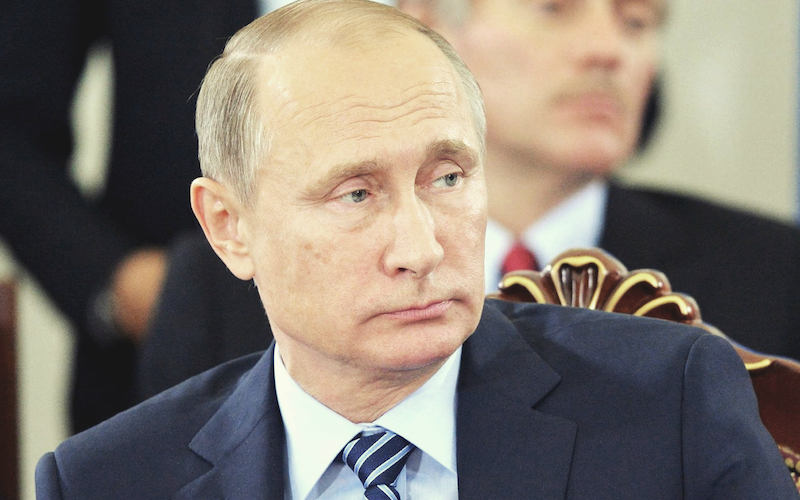
The Trust Problem in West-Russia Relations
Russian-West relations are now at their lowest level since the end of the Cold War. It is important to focus not on the power constellation but on the problem of (dis)trust that has thus far produced hardened fronts on both sides. Dmitri Trenin has recently described the current state of this relationship by focusing on the question of how to avoid a hot war.
At the same time and in spite of the evidence of increased alienation accompanied by provocative rhetoric on both sides, a war is unlikely to happen, although Russia is still considered a “threat to stability and order” with “malevolent, dangerous behavior.” One of the dominant strategies in dealing with Russia is deterrence.
Back to the containment strategy
The containment strategy consists of making Russia understand that the West is a unified front that can and will be decisively opposed to Russian power-political ambitions. Ivo Daalder recently pleaded in the Financial Times for a new deterrence strategy against Russia, in which he claimed that “now, as then, containment must be a long-term strategy, best sustained by emphasizing western strengths and Russian weaknesses. The core of our strength is western unity. That is why President Barack Obama and other NATO leaders were right to respond to the invasion of Ukraine by boosting the Alliance’s defenses, including by deploying forces to the east.”
This general strategy should further be flanked by a continuous sanctioning policy. Only if Russia makes it clear that it is ready for a dialogue, then the West would be ready to talk, however, at the moment “Russia is not interested in extending a friendly hand.” Thus it is suggested that a precondition for a normalization of relations only depends on Russia’s capitulation. The core of this strategy is to wait until Moscow changes its behavior, and if it does not do so alone, it will be helped by a deterrence strategy consisting of the demonstration of military strength and policy based on sanctions.
However, Philipp Breedlove, the former Supreme Commander of NATO forces in Europe, considers this political vector against Russia as not very promising. According to Breedlove, the military should not be the first to be used. A productive dialogue must occur, which is a dialogue that rebuilds trust. In fact, it is so that in words of Jonathan Marcus, “without that basic level of trust and understanding, any dialogue rests upon shaky foundations. It was never meant to be like this. The end of the Cold War was supposed to usher in a new era.”
This means that the first step is the building of trust, without which no further efforts of normalization can take place. The only problem is that the Western deterrence strategy with NATO troops deployed in Eastern Europe, and a sanctions regime does not contribute to building up confidence, but actually brings about the opposite. Even if the West tried to gain more confidence, the addressees should not be only Putin or the Russian political elite, but broader Russian society. For Putin is actually the product of it. “We are not dealing here with Putin’s Russia but with Russia’s Putin,” Dmitri Trenin said a few months ago. With this statement, he wanted to imply that Putin’s political course of confrontation and of treating the West as an opposite of what Russia is has touched the most sensible and receptive nerve of most Russians. Consequently, a turnaround and a possible rapprochement are only to be expected after a big part of Russian society has separated itself from the strong mistrust of the West.
However, as this mistrust has proved its legitimacy many times during Russian history, and is deeply rooted, a lot of patience and time are needed in order to break out of it.
Understanding Russia’s distrust
In the recently published article by Vladislav Inozemcev about the psychic type of a hysterical nation, the author points to an increasing paranoia and consequent foreclosure from the outside world in the Russian case. He ascribes this mindset to a fear of the outside world based on the feeling of the country’s inability to equally compete with global players in the economic market on one side and to the lack of an innovative alternative political and societal model on the other. This feeling of inferiority produces anger and the desire for foreclosure. The outer world is perceived subjectively as hostile, a view that dictates Russian internal and external political behavior. The article offers a good approach to dealing with Russia, namely the psychological one. Neither economic nor political arguments can explain Russia’s policy as well as the psychological one. Only if Russia can be pulled out of its hollow of mistrust, cooperation with the West will be possible, a task, that is not easy to fulfill due to the historical nature of the phenomenon.
In The Revenge of Geography, American journalist Robert Kaplan ties the mistrust rooted in Russian society with the geography and history of the country. The vast territory and easy access by land have made Russia very vulnerable to military raids. Unlike France and Great Britain that faced their enemies overseas, Russians faced them already on their own territory, and so they learned from early on in their history to be anxious and vigilant. The uncertainty and distrust on the part of Russians are, so to speak, inherent. Of course this view is very deterministic and as the only explanation insufficient, while a broader historical perspective still might offer some interesting insights.
If one looks at Soviet history, one finds there the domestic political and social terror of the 1930s and beyond, the attack of Hitler’s Germany on 22 June 1941 and then the long period of the Cold War that created a sensation of chronic antagonism between the Soviet Russia and the West. Thus Russian society has learned to be always on the watch during the entire Soviet period, and to trust no one in either the interior or the exterior. Caution, tension and distrust used to be a norm. According to Jeoffrey Hosking, general social distrust does not disperse easily, and so the phenomenon of low trust level continued to persist also in post-soviet Russia.
In the 1990s, a brief attempt was made to establish a relationship of trust and confidence between Russia and the West that, however, did not last long and started to vanish from 1999 onwards as more and more countries of the former East Bloc joined NATO and then the EU. These events strengthened the suspicion of encirclement in chronically uncertain Russia. After the attacks of 9/11, Moscow showed solidarity and offered cooperation in fighting international terrorism and extremism. Vladimir Putin was the first head of state to express his condolences to the American government and to promise support. However, from 2003 on Georgia, Ukraine and Kyrgyzstan were hit by color revolutions which the West showed solidarity with. The very unstable basis of trust was further eroded and finally destroyed after the Russo-Georgian war in 2008.
More understanding, less force application
This brief historical outline has revealed that there has never really existed a trust based relationship between Russia and the West. That’s why today it is not about restoring trust, but rather about building the first foundation or the first stone of the foundation of it. If a co-operation is supposed to take place in the near or distant future, a complete reboot is required. To this end, the West should show more understanding of the mentioned peculiarities of Russian psychology and of its social and cultural development, which affects Russian current foreign policy. Future cooperation should be based on more awareness of these peculiarities and take into account Russian interests. In this context it should be mentioned that the anticipated “friendship” between Putin and Trump seems less likely from this point of view, because these two persons are characterized by a very high level of distrust and animosity toward the outside world.
If Russia is interested in cooperation, it should also show respect for Western values and adhere to the European legal and security architecture, simultaneously re-conceptualizing its own role in Europe for which the West needs to accept Russia as an equal participant and co-designer. In this case a new international agreement based on the Helsinki Act or the Paris Charter could be considered.
On the whole, Russia and the West should strive for more mutual understanding of each other’s peculiarities and less force application, in order to slowly build a closer trust based relationship, providing that mutual political will and a clear vision of future cooperation are present.

